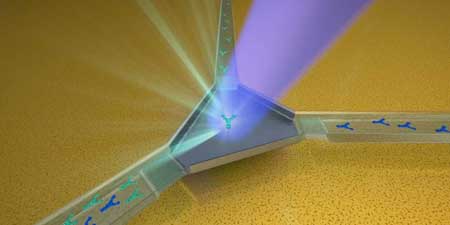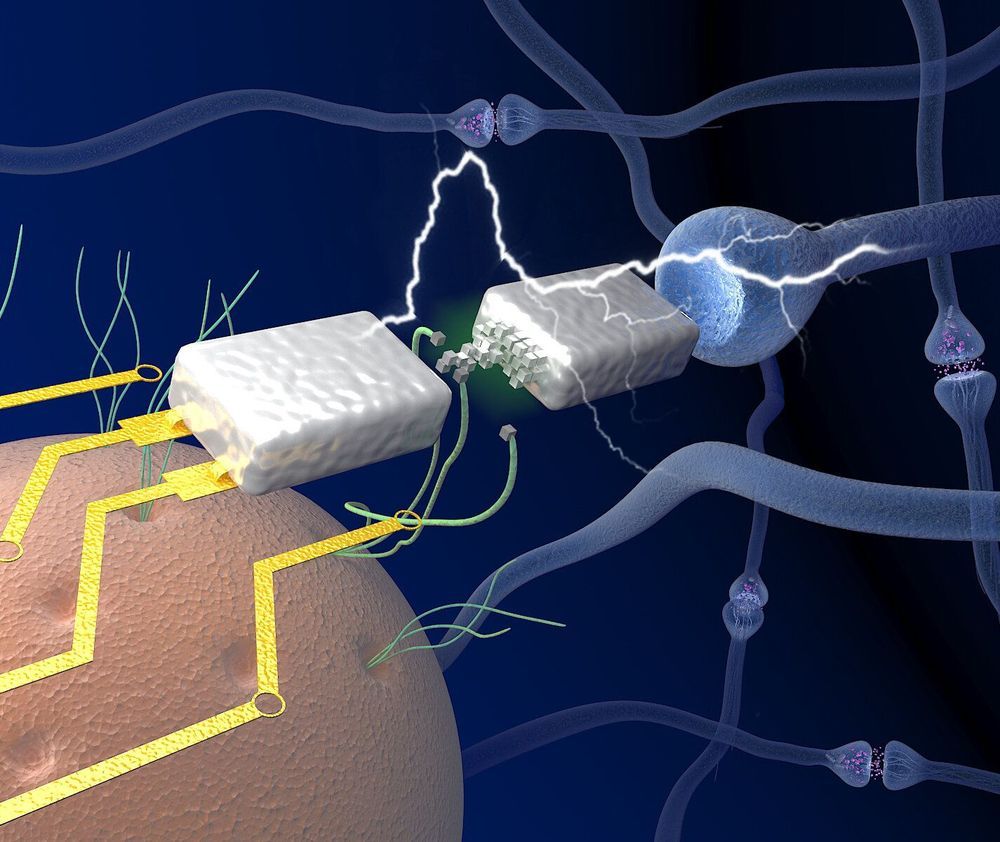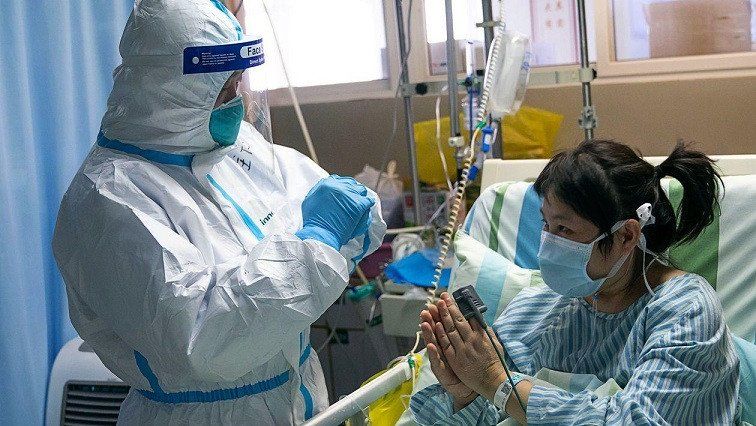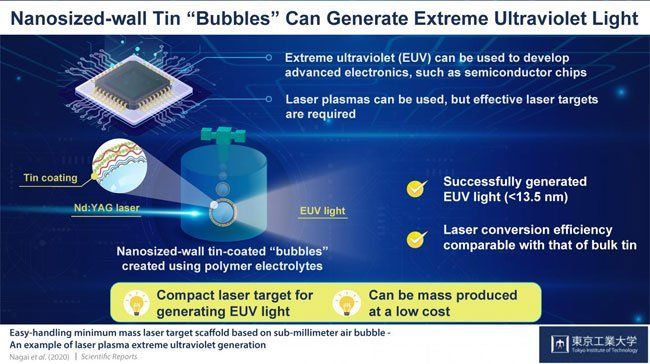Newly-developed nanovalves allow the flow of individual nanoparticles in liquids to be controlled in tiny channels. This is of interest for lab-on-a-chip applications such as in materials science and biomedicine.


In a study published in Nature, a UCLA-led team of researchers describe how the nanomachine recognizes and kills bacteria, and report that they have imaged it at atomic resolution. The scientists also engineered their own versions of the nanomachine, which enabled them to produce variations that behaved differently from the naturally occurring version.
Their efforts could eventually lead to the development of new types of antibiotics that are capable of homing in on specific species of microbes. Drugs tailored to kill only a certain species or strain of bacteria could offer numerous advantages over conventional antibiotics, including lowering the likelihood that bacteria will develop resistance. In addition, the tailored drugs could destroy harmful cells without wiping out beneficial bugs in the gut microbiome, and they could eventually offer the possibilities of being deployed to prevent bacterial infections, to kill pathogens in food and to engineer human microbiomes so that favorable bacteria thrive.
The particle in the study, an R-type pyocin, is a protein complex released by the bacterium Pseudomonas aeruginosa as a way of sabotaging microbes that compete with it for resources. When a pyocin identifies a rival bacterium, it kills the bacterium by punching a hole in the cell’s membrane. P. aeruginosa, frequently a cause of hospital-acquired illness, is found in soil, in water and on fresh produce. The germ is commonly studied and its biology is well understood.

Only 10 years ago, scientists working on what they hoped would open a new frontier of neuromorphic computing could only dream of a device using miniature tools called memristors that would function/operate like real brain synapses.
But now a team at the University of Massachusetts Amherst has discovered, while on their way to better understanding protein nanowires, how to use these biological, electricity conducting filaments to make a neuromorphic memristor, or “memory transistor,” device. It runs extremely efficiently on very low power, as brains do, to carry signals between neurons. Details are in Nature Communications.
As first author Tianda Fu, a Ph.D. candidate in electrical and computer engineering, explains, one of the biggest hurdles to neuromorphic computing, and one that made it seem unreachable, is that most conventional computers operate at over 1 volt, while the brain sends signals called action potentials between neurons at around 80 millivolts—many times lower. Today, a decade after early experiments, memristor voltage has been achieved in the range similar to conventional computer, but getting below that seemed improbable, he adds.
O,.o circa 2007.
Theoretical physicists at the University of St. Andrews have created ‘incredible levitation effects’ by engineering the force of nature which normally causes objects to stick together by quantum force. By reversing this phenomenon, known as ‘Casimir force’, the scientists hope to solve the problem of tiny objects sticking together in existing novel nanomachines.
Professor Ulf Leonhardt and Dr Thomas Philbin of the University’s School of Physics & Astronomy believe that they can engineer the Casimir force of quantum physics to cause an object to repel rather than attract another in a vacuum.
Casimir force (discovered in 1948 and first measured in 1997) can be demonstrated in a gecko’s ability to stick to a surface with just one toe. However, it can cause practical problems in nanotechnology, and ways of preventing tiny objects from sticking to each other is the source of much interest.

Many researchers from all around the world have joined forces to fight the ongoing coronavirus outbreak that very recently originated in Wuhan, China. As always, nanotechnology does have a solution for almost every problem we face, including now-struggling global health: a nanoparticle-based coronavirus vaccine was successfully developed.
A new nanotechnology promises to make future concrete stronger and more resilient.
Scientists are one step closer to adapting the bacteria-killing power of a naturally occurring nanomachine, a tiny particle that performs a mechanical action.
In a study published in Nature, a UCLA-led team of researchers describe how the nanomachine recognizes and kills bacteria, and report that they have imaged it at atomic resolution. The scientists also engineered their own versions of the nanomachine, which enabled them to produce variations that behaved differently from the naturally occurring version.
Their efforts could eventually lead to the development of new types of antibiotics that are capable of homing in on specific species of microbes. Drugs tailored to kill only a certain species or strain of bacteria could offer numerous advantages over conventional antibiotics, including lowering the likelihood that bacteria will develop resistance. In addition, the tailored drugs could destroy harmful cells without wiping out beneficial bugs in the gut microbiome, and they could eventually offer the possibilities of being deployed to prevent bacterial infections, to kill pathogens in food and to engineer human microbiomes so that favorable bacteria thrive.

Department of Engineering, Aarhus University, is coordinating a FET-Open backed project to build an entirely new AI hardware technology using nano-scale spintronics that can radically change the way in which computers work. The project will develop a neuromorphic computing system using synaptic neurons implemented in spintronics: a novel AI hardware that can set a framework for AI software in a physical system built like a human brain, upping computer performance by up to 100.000 times.

Scientists at Tokyo Institute of Technology (Tokyo Tech) have generated low-cost extreme ultraviolet (EUV) light by creating tin thin-film spheres using a polymer electrolyte “soap bubble” as a template and irradiating it with a laser.
#EUV #photonics
The team from Tokyo Tech, working with colleagues from University College Dublin, set out to find efficient, scalable, low-cost laser targets that could be used to generate EUV. The scientists created a tin-coated microcapsule or “bubble” — a low-density structure weighing as little as 4.2 nanograms and with a high level of controllability. For the bubble, they used polymer electrolytes, which are a dissolution of salts in a polymer matrix. The salts act as surfactants to stabilize the bubble.
The scientists coated the bubble with tin nanoparticles. “We produced polyelectrolyte microcapsules composed of poly(sodium 4-styrene-sulfonate) and poly(allylamine hydrochloride) and then coated them in a tin oxide nanoparticle solution,” professor Keiji Nagai said.
To test the bubble, the scientists irradiated it using a neodymium-YAG laser. This resulted in the generation of EUV light within the 13.5-nm range. The team further found that the structure was compatible with the conventional EUV light sources that are used to manufacture semiconductor chips.

Among the ongoing mysteries surrounding last week’s arrest of Harvard University nanoscientist Charles Lieber is the precise nature of the research program Lieber was conducting in his cooperation with Chinese researchers.
Lieber was arrested on 28 January on charges of making false statements to U.S. law enforcement officials and federal funding agencies about a collaboration he forged with researchers in China. He was released two days later on a $1 million bond. An affidavit outlining the charges against Lieber notes that in January 2013, he signed an agreement between Harvard and Wuhan University of Technology (WUT) in China. According to the affidavit, “The stated purpose of the agreement, which had a five-year effective term, was to ‘carry out advanced research and development of nanowire-based lithium ion batteries with high performance for electric vehicles.’”
Officials at WUT have not responded to requests for comment on their agreement with Lieber. But it outlines just the kind of high-tech work that U.S. prosecutors involved in efforts to investigate Chinese attempts to acquire advanced technology from U.S.-based researchers say they are concerned about. They allege that the Chinese government has used such collaborations to improperly take advantage of the federally funded research enterprise, and gain an edge in economic and military advances.